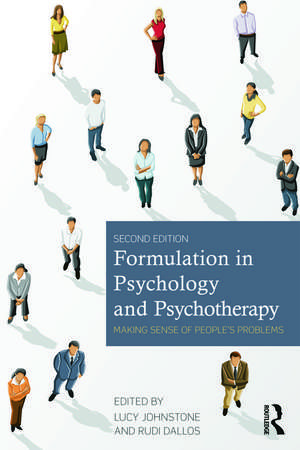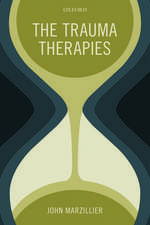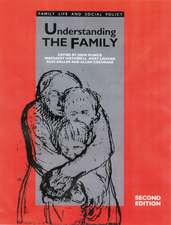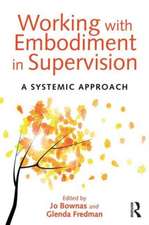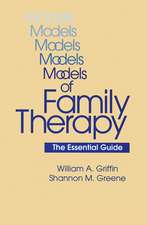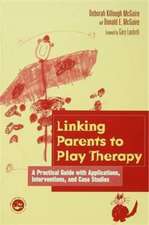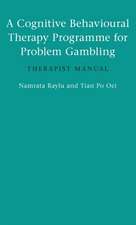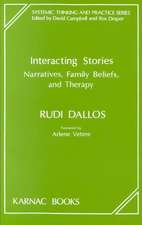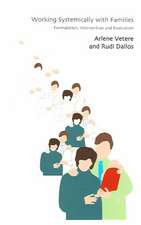Formulation in Psychology and Psychotherapy: Making sense of people's problems
Autor Lucy Johnstone, Rudi Dallosen Limba Engleză Paperback – 20 iun 2013
| Toate formatele și edițiile | Preț | Express |
|---|---|---|
| Paperback (1) | 317.98 lei 3-5 săpt. | +23.98 lei 7-13 zile |
| Taylor & Francis – 20 iun 2013 | 317.98 lei 3-5 săpt. | +23.98 lei 7-13 zile |
| Hardback (1) | 1170.82 lei 6-8 săpt. | |
| Taylor & Francis – 27 iun 2013 | 1170.82 lei 6-8 săpt. |
Preț: 317.98 lei
Preț vechi: 334.72 lei
-5% Nou
60.84€ • 63.53$ • 50.36£
Carte disponibilă
Livrare economică 15-29 martie
Livrare express 01-07 martie pentru 33.97 lei
Specificații
ISBN-10: 0415682312
Pagini: 320
Ilustrații: 31 black & white illustrations, 1 black & white tables
Dimensiuni: 156 x 234 x 18 mm
Greutate: 0.52 kg
Ediția:Revizuită
Editura: Taylor & Francis
Colecția Routledge
Locul publicării:Oxford, United Kingdom
Public țintă
Postgraduate, Professional, and Professional Practice & DevelopmentCuprins
List of Figures. List of Tables. List of Contributors. Johnstone & Dallos, Introduction to Formulation. Dudley & Kuyken, Case Formulation in Cognitive Behavioural Therapy: A Principle-driven Approach. Leiper, Psychodynamic Formulation: Looking Beneath the Surface. Dallos & Stedmon, Systemic Formulation: Mapping the Family Dance. Harper & Spellman, Formulation & Narrative Therapy: Telling a Different Story. McLelland, Reformulating the Impact of Social Inequalities: Mad, Bad and Dangerous to Know. Winter & Procter, Formulation in Personal and Relational Construct Psychology: Seeing the World Through Clients’ Eyes. Dallos, Stedmon & Johnstone, Integrative Formulation in Theory. Dallos & Stedmon, Integrative Formulation in Practice: A Dynamic, Multi-level Approach. Using Formulation in teams. Using Integrative Formulation in Health Settings. Controversies and Debates about Formulation.
Notă biografică
Lucy Johnstone is a consultant clinical psychologist and a former Programme Director of the Bristol Clinical Psychology Doctorate. She has worked in adult mental health settings for many years.
Rudi Dallos is the Research Director on the Clinical Psychology training programme at the University of Plymouth. He also works as a clinical psychologist specialising in work with adolescents and their families.
Recenzii
- Huw Green, Clinical Psychology Forum
'It is fascinating to view the case studies through the lenses of each therapeutic approach, and the divergent ways of working that follow. Seeing how therapists from each approach would work with the two clients helped clarify the similarities and differences between models...The book is clearly structured, attractively set out and easy to read... I enjoyed this book and would recommend it to anyone interested in the concept of formulation (which should be all of us) and in comparing and contrasting different therapeutic approaches. This also means that it is likely to be particularly helpful for integrative training courses.'
- Dr. Els van Ooijen, co-author of Integrative Counselling and Psychotherapy: a relational approach, Therapy Today
'Formulation in Psychology and Psychotherapy... which is now in its second edition, demonstrates the process of clinical formulation from a wide variety of clinical perspectives. Similar to the first edition, Johnstone and Dallos have created an edited text that brings together numerous contributors from the mental health professions to give us different theoretical perspectives on the process of clinical formulation... Books like this one reemphasize the necessity of grounding clinical practice in clear articulations of theory and rich descriptions of clinets' lives and experiences. In this sense, those drawn to narrative and more generally qualitative understandings of human experience will apprecaite the attention to clients' life stories and ways of making meaning of the struggles they face... The second edition of Formulation in Pscyhology and Psychotherapy is a thoughtfully constructed text that will be useful for graduate students, academics, and metnal health professionals who want clear, detailed, and theoretically diverse ways of understanding the process of clinical formulation.'
- Alexandra L. Adame, Seattle University, Journal of Constructivist Psychology
Praise for the first edition:
'Essential reading for students and trainees as well as qualified professionals. It demonstrates the richness of ideas which psychologists and therapists contribute to their understanding of clients' problems as well as confronting the complex issues arising from the idea of formulation itself.'
– Mary Boyle, Professor Emeritus of Clinical Psychology, University of East London
Praise for the first edition: 'Essential reading for students and trainees as well as qualified professionals. It demonstrates the richness of ideas which psychologists and therapists contribute to their understanding of clients' problems as well as confronting the complex issues arising from the idea of formulation itself.' - Mary Boyle, Professor Emeritus of Clinical Psychology, University of East London
Descriere
The first edition of Formulation in Psychology and Psychotherapy caught the wave of growing interest in formulation in a clinical context. This completely updated and revised edition summarises recent practice, research, developments and debates while retaining the features that made the first a leading text in the field. It contains new chapters on personal construct formulation, formulation in health settings, and the innovative practice of using formulation in teams.
The book sees formulation as a dynamic process which explores personal meaning collaboratively and reflectively, taking account of relational and social contexts. Two case studies, one adult and one child, illustrate the use of formulation from the perspectives of expert clinicians from six different theoretical positions. The book encourages the reader to take a constructively critical perspective on the many philosophical, professional and ethical debates raised by the process of formulating people’s problems. Among the issues explored are:
The social and political context of formulation
Formulation in relation to psychiatric diagnosis
The limitations of formulation
Controversies and debates about formulation
This readable and comprehensive guide to the field provides a clear, up to date and thought-provoking overview of formulation from a number of perspectives, essential for clinicians working in all areas of mental health and social care, psychology, therapy and counselling.
